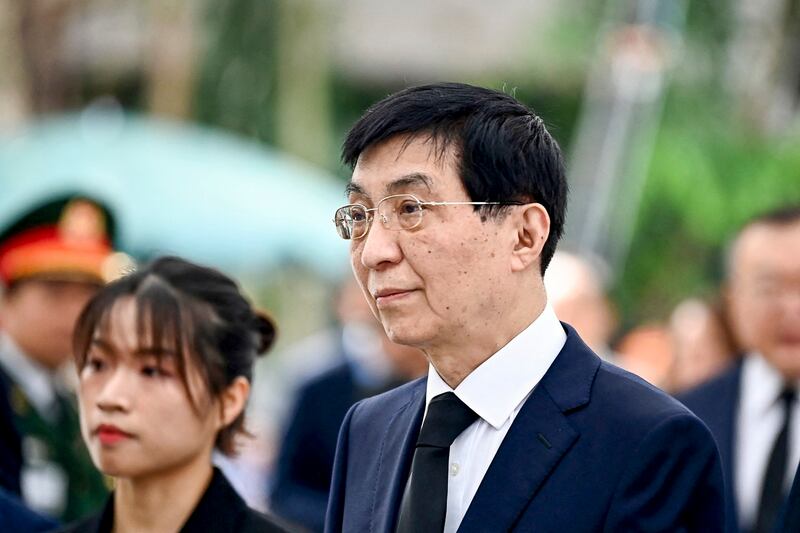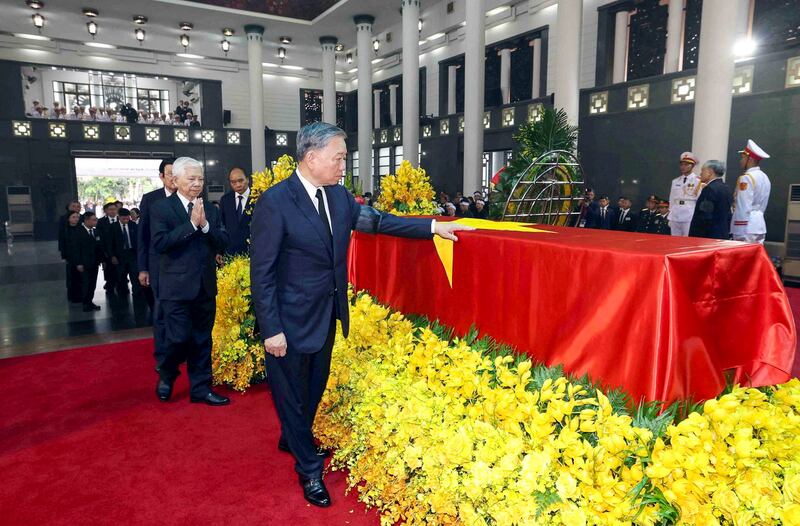Ruling Chinese Communist Party ideologue and 'United Front' czar Wang Huning – who on Thursday attended the funeral of Vietnamese leader Nguyen Phu Trong – appears to have been favored in a recent move by party leader Xi Jinping following a top political meeting in Beijing, analysts told RFA Mandarin.
Wang, who is the fourth-ranked member of the all-powerful Politburo Standing Committee, has been appointed "first deputy leader" of the drafting group for the third plenary session of the party's Central Committee, state media reported, in what analysts said is an indication of a bigger role for him at the expense of Cai Qi, Xi's chief of staff.
Xi leads the document drafting group that will be charged with formulating detailed policy based on the meeting, with Wang, Cai and Ding Xuexiang working under him as deputies, state news agency Xinhua reported.

However, Wang is ranked first among those deputies, while Cai's predecessor had previously served in the role, commentators said.
The move indicates a more important role for Wang, the architect of Xi's personal brand of ideology, Xi Jinping Thought, who previously headed the party's United Front outreach and influence arm.
It likely means that that the government's economic policies will likely be long on spin and short on substance, while continuing Xi's insistence on top-down economic planning that owes more to Marxist economics than to the economic reform era begun by late supreme leader Deng Xiaoping, according to Xia Ming, politics professor at New York's City University.
"Xi Jinping is no longer capable of delivering real results on the economy, so he'll definitely need to come up with various political and propaganda tricks," Xia said. "The entire third plenum of the 20th Central Committee was about carrying on United Front work and strengthening external propaganda, manipulating people's thinking ... to provide a false sense of legitimacy."
"Wang Huning is a veteran writer and spin doctor, and his role will be to exercise a form of political deception," he said.
Ideology-minded Wang
Independent political commentator Chen Daoyin agreed, saying that former propaganda ministers in China are typically ideologically, not practically minded.
"Wang is better at ideology than other members of the Politburo Standing Committee, like Cai Qi," Chen said, adding that the break with precedent also indicates how powerful Xi himself has become within the highest levels of leadership.
"It also shows us that Xi Jinping is the only person who wields real power in the party, because he can arbitrarily assign work to the other standing committee members."
Feng Chongyi, a professor at the University of Technology in Sydney, said Xi has broken many rules of rank and precedent since taking power in 2012, and the elevation of Wang could be a response to recent media reports claiming that Cai was growing in power.

Bloomberg reported in January that Cai "is quietly emerging as one of China’s most influential politicians," saying that he had unusual political clout for a fifth-ranked Politburo Standing Committee member.
The article said Cai was "the only member of China’s top decision-making body to publicly travel overseas with Xi during his decade-plus in power,” citing Cai's appearance next to Xi at overseas summits with U.S. President Joe Biden, Russian President Vladimir Putin and South African President Cyril Ramaphosa.
It said Cai's role had put him on a level with second-ranking premier Li Qiang.
"[Xi] is very sensitive to what people are saying," Feng said. "When there were rumors going round that he had suffered a stroke, he made a point of going to the Vietnamese embassy to show that he knew about them."
RELATED STORIES
[ Reforms will mean more power for Communist Party leader Xi Jinping: analystsOpens in new window ]
[ China's Xi Jinping gets third term, packs ruling committee with loyal 'minions'Opens in new window ]
Rumors that Xi suffered a stroke during the third plenum, which ran in Beijing from July 15-18, have been widely seen on Russian social media platforms.
Xi Jinping visited the Vietnamese embassy in Beijing on July 20 to pay his respects following the death of Nguyen Phu Trong, late General Secretary of the Communist Party of Vietnam, state news agency Xinhua reported.
"Of course he's sensitive to the rumors that Cai Qi has too much power, and could challenge him," Feng said. "So he is sharing out some of Cai Qi's power with Wang Huning, so he doesn't become too dependent on him."
"Then he'll let them fight it out between them, because they are all dependent on him anyway."
Translated by Luisetta Mudie.
